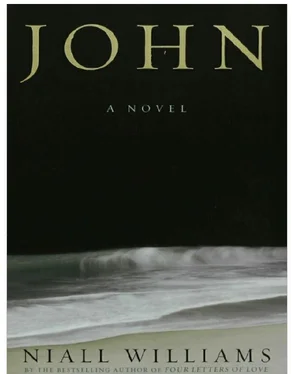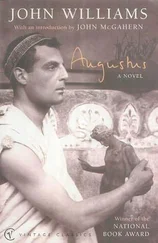'Linus, go,' Matthias says over his shoulder. 'Attend him. But do not call him the Beloved.' He does not take his eyes from Papias. Stones click the other's departure toward the cave.
'Young Papias, you are weary,' Matthias says. 'Weary from troubles and grief. I read it on your face. Your cold hands burn red.' He shakes his head slightly, as though there is an unfair balance he would set right. 'Go, go and be at peace.'
Released, Papias begins to turn. But the cloak is still about him. 'But Papias, know that if you have concerns, if the Ancient appears' — Mathias pauses to consider the word — 'diminished in his faculties, exhausted, if you consider him too greatly taxed by his duties, come and let me know at once. Do this. I will assist you in all things. Do you understand me?'
Papias nods to be free.
'Go then, and may God bless you.'
At last he hurries away along the sea-washed stones. The day is calm but dull. Weak light is smeared. Grey waters stir restlessly. He descends to the eastern shore and across the large rocks. Seabirds scatter and return to stand behind him. Places he clambers on hand and foot. The rocks rise toward a short cliff as if the sea has broken them from the land and abandoned them. Papias makes his way upwards. In crevices are feathers or twigs or small bones decaying in sunlight and sea air. Sometimes in the rock gaps are clear falls to still pools below. His reddened hands cling to pull his weight upward across a flat-faced slab. He kicks into a smallest ledge, goes cheek-printed against the rock and hauls himself head and chest over, then climbs atop. He stands a moment, looks up at the fringe of green and the ragged thorn bush that leans aslant from the cliff edge. A powdery ground is at the top. The sea now well below him, he considers at once the route onwards and does not look down.
He does not see Auster following.
At full stretch Papias can reach the cliff top. Briefly cruciform, he clings either side of him to the rough face of the island. His fingers scrabble. Ground falls away. There is no hold. He should go back down and around the long way. But then he will be seen. Instead he scratches at the dry dirt and pebbles above him. There is nothing solid. An error now and the fall would break his back on the rocks below. Papias feels the rashness of the plan, how guilt skews the mind. His toes are pressed in the tight mouth of a thin ledge, his heels in the air. But he won't go back. He is not sure he could. He hangs there some moments, a cross of conviction. With breathy whisper the sea below collapses upon itself. Sounds of soft breakage and gull cry and the beating of his own heart: these things Papias hears. He hands away loose dirt, its click and clatter marking the distance down. He tries a claw of cliff top, but there is no support in it. It gives easily. Ache knots in his calves. For a moment there crosses his mind the thought of letting go, of stepping out of his toeholds and falling headfirst, the brief bliss of flight, his robe aflutter and the perfect calm of a mind cleaned of all concern. It is a moment only. Then he is returned to the faith that there is something for him, that there is a destiny yet unknown that is his and that it has been scripted by the Lord himself. Emboldened so, he grasps the thorn bush. He takes it in both hands, the coarse knotty twist of it, then pulls.
It gives but only a little. Its roots, not deep, are gone wide for water. Papias releases his footholds and scales the cliff face, hangs briefly asway, kicks blood toes off rock, heaves, then rises face-first into the thorn bush till he can get his chest above ground and fall forwards, panting on the upper edge.
He rolls over for breath. The sky is grey and unforgiving.
Papias rises quickly. His face is scratched with thorns. He hurries across the bleak terrain toward the house of Marina.
I fail you.
Lord, I am weak. I am old. I forget much.
I fail you.
If a servant fail his master, ought not that master to find a better servant? What I have I hold not. Prochorus is dead. They speak against you even amongst those here. I hear it, though I hear it not. I see it, though I see it not.
I fail you.
It was long ago. I am ancient as dust. I will not see Galilee again.
Give me to drink. The woman of Samaria by Jacob's well. The others gone into the city of Sychar. I stayed with you. You asked her for water, and she was surprised that a Jew ask a Samaritan. You said, 'If thou knewest the gift of God, and who it is saith to thee, give me to drink, thou wouldst have asked of him, and he would have given thee living water.
'Whosoever shall drink of the water I shall give him shall never thirst; but the water that I shall give him shall be in him a well of water springing up into everlasting life.'
Sir, give me this water that I thirst not.
Lord, give me to drink.
I am your poor servant aged as dust.
Weary as ground too often sown. I confess it. What can I yield now?
We are few and weak, and pray that you may come.
Come, Lord, give me to drink.
By the entrance of the cave, Linus sits. He hears a murmuring from the Apostle, endeavours to make out the words. Then there is the silence peculiar to that cave that is not silent but filled always with the sound of water running from invisible source inside the hill above. In the early part of the afternoon, Ioseph comes along the beaten pathway to the cave. He, too, is thin and wiry and sharp-boned; his beard is coarse and white.
'Master?' he says, blinking into the darkness.
'Ioseph, come.'
John extends his hand and the disciple takes it in both of his.
'Master, I come to confess despair,' Ioseph says.
And at once John grasps his arm and rises. 'Come,' he whispers, 'bring me outside.'
Linus stands. 'I will attend you, Master.'
'No. Ioseph will see to me.'
'Matthias has instructed me, Master.'
'To disobey me? Stay. I will return, fear not. Ioseph, come.'
'I will follow in case. .'
'You will stay!'John's voice is louder, greater than himself. Linus is startled back a step and looks to Ioseph then says: 'You may fall, Master, Ioseph is old and infirm. I can follow at ten paces and. .'
'A third time: you will stay, Linus. You will not follow. I command it.'
In Linus's chin a pulse of muscle trembles. His pale eyes are a thin metal of disdain. His face is hotly reddened. How dare the old man talk to him so.
The two elders walk past him and go outside. It is after the midday and the sun has not broken the cloud. Disappointed grey light falls. In the sombre sea down the pathway below them short combed waves are whipped and swallowed. There is a salt tang on the wind. The two men proceed along a route of broad stone to a place where there is natural seating of sun-and-rain-flattened rock.
'He is not behind us?'
'No, Master. He has stayed.'
'Good. Here, then, let us sit.'
John feels with his hand the smooth rock. Always in his touching a tapping, slight, quick, light, as though he affirms the real by his fingertips and knows only then that he is in it. They face the western shore, the Apostle's face tilted to receive what light may be.
'This death has touched me closely,' Ioseph says. 'I sin of despair.'
'You are not alone, Ioseph. It has touched us all.'
'I fear. .' The elder disciple pauses, presses his palms together.
'Tell me.'
'I fear myself. I fear my weakness. Today I have thought I will die here on Patmos, like Prochorus, waiting for the Lord, when before I had supposed I would live until the day. I know this is vanity. What am I that is different from others? Why should I endure when others perish? For what reason? Because I have believed? Others have believed and been crucified. Because I have lived this long with you, old Master, because we have walked together in lands as far as Phenice and Antioch before banishment here, and because I believe the Lord watches over you and all of us? That you will live until he comes again, I am certain. And so have hoped that I, too, might see the glory. This is my first sin, I confess it: this vanity. Then the death of Prochorus has made me chastise myself. He was my friend. Why should he die? And in the darkness of my thinking a serpent has come: we all will die here, it says. We are forgotten and a plague comes now amongst us. I confess it. I have listened to the serpent, and my flesh has grown cold with the thought. I have clung to myself and wept, touched my face to find plague I dreamt would be coming. My prayers ascend not. They lie about my feet like stone birds. I despair.'
Читать дальше










